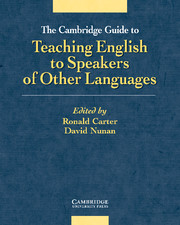Book contents
- Frontmatter
- Contents
- List of figures
- List of abbreviations
- Acknowledgements
- List of contributors
- Introduction
- Chapter 1 Listening
- Chapter 2 Speaking
- Chapter 3 Reading
- Chapter 4 Writing
- Chapter 5 Grammar
- Chapter 6 Vocabulary
- Chapter 7 Discourse
- Chapter 8 Pronunciation
- Chapter 9 Materials development
- Chapter 10 Second language teacher education
- Chapter 11 Psycholinguistics
- Chapter 12 Second language acquisition
- Chapter 13 Bilingualism
- Chapter 14 Sociolinguistics
- Chapter 15 Computer-assisted language learning
- Chapter 16 Observation
- Chapter 17 Classroom interaction
- Chapter 18 English for academic purposes
- Chapter 19 English for specific purposes
- Chapter 20 Assessment
- Chapter 21 Evaluation
- Chapter 22 Syllabus design
- Chapter 23 Language awareness
- Chapter 24 Language learning strategies
- Chapter 25 Task-based language learning
- Chapter 26 Literature in the language classroom
- Chapter 27 Genre
- Chapter 28 Programme management
- Chapter 29 Intercultural communication
- Chapter 30 On-line communication
- Postscript: The ideology of TESOL
- Glossary
- References
- Index
Chapter 16 - Observation
Published online by Cambridge University Press: 07 September 2010
- Frontmatter
- Contents
- List of figures
- List of abbreviations
- Acknowledgements
- List of contributors
- Introduction
- Chapter 1 Listening
- Chapter 2 Speaking
- Chapter 3 Reading
- Chapter 4 Writing
- Chapter 5 Grammar
- Chapter 6 Vocabulary
- Chapter 7 Discourse
- Chapter 8 Pronunciation
- Chapter 9 Materials development
- Chapter 10 Second language teacher education
- Chapter 11 Psycholinguistics
- Chapter 12 Second language acquisition
- Chapter 13 Bilingualism
- Chapter 14 Sociolinguistics
- Chapter 15 Computer-assisted language learning
- Chapter 16 Observation
- Chapter 17 Classroom interaction
- Chapter 18 English for academic purposes
- Chapter 19 English for specific purposes
- Chapter 20 Assessment
- Chapter 21 Evaluation
- Chapter 22 Syllabus design
- Chapter 23 Language awareness
- Chapter 24 Language learning strategies
- Chapter 25 Task-based language learning
- Chapter 26 Literature in the language classroom
- Chapter 27 Genre
- Chapter 28 Programme management
- Chapter 29 Intercultural communication
- Chapter 30 On-line communication
- Postscript: The ideology of TESOL
- Glossary
- References
- Index
Summary
Introduction
Observation, as the term is used here, refers to the purposeful examination of teaching and/or learning events through systematic processes of data collection and analysis. Such events may occur in untutored environments (see Chapter 12) or in formal instructional settings. This chapter focuses on observation in language classroom environments. (See also Nunan 1992: 91–114.)
In language teaching and applied linguistics, classroom observation has historically served four broad functions. First, pre-service teachers are often observed in the practicum context by teacher educators, who typically give them advice on the development of their teaching skills as a regular part of pre-service training programmes (Day 1990). Second, practising teachers are observed either by novice teachers or by colleagues, for the professional development purposes of the observer. Third, practising teachers are observed by supervisors, course co-ordinators, department heads, principals or headteachers, in order to judge the extent to which the teachers adhere to the administration's expectations for teaching methods, curricular coverage, class control, etc. Fourth, observation is widely used as a means of collecting data in classroom research.
In each of the four contexts outlined above, teachers and learners have often been observed by outsiders. Recently, however, teachers themselves have undertaken classroom observation for a variety of reasons. These include peer observation for professional development purposes (Rorschach and Whitney 1986; Richards and Lockhart 1991–92), peer coaching (Joyce and Showers 1982, 1987; Showers 1985; Showers and Joyce 1996) and action research (Kemmis and McTaggart 1988; Mingucci 1999).
- Type
- Chapter
- Information
- Publisher: Cambridge University PressPrint publication year: 2001
- 7
- Cited by



